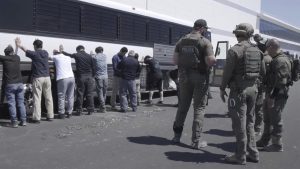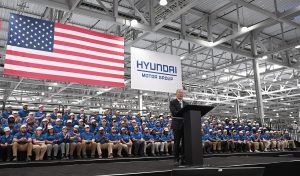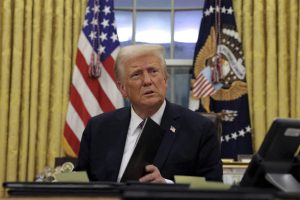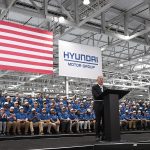Hundreds of South Korean workers detained by an ICE raid at a Hyundai battery plant in Georgia were returned home to cheers from family and government officials. But Korean companies are worried that more immigration raids will follow, throwing into chaos Korean-owned auto, shipbuilding, steel and electrical equipment operations across the U.S. Headlight.News has more.
The roughly 300 Korean workers detained during an ICE raid at a Hyundai battery plant in Georgia last week returned to cheers after arriving at Incheon airport on a flight chartered by the South Korean government.
The incident sparked a diplomatic furor between two traditionally close allies and raised anew questions about Pres. Donald Trump’s immigration policies and the way they are being handled in the field. The raid last week targeted an automaker that had previously been praised by Trump for committing $26 billion in U.S. investments, a move Hyundai said would create tens of thousands of American jobs.
Even as the once-detained Koreans reunite with their families, there is fear that other Korean-owned operations in the U.S. could next be targeted by ICE. LG Energy Solution, which is Hyundai’s partner at the Georgia plant, has told its employees across Michigan to lie low. It is concerned that even those with proper documentation could be swept up in new raided by the masked officers from Immigration and Customs Enforcement.
Raids shake South Korean business in the U.S.
The battery plant targeted by the raid near Savannah, Georgia is a joint venture with LG Energy Solution. The incident saw about 475 workers in total detained. Of the roughly 300 Koreans, 47 were direct LG employees. according to a company statement, and about 250 of the worked for partner companies.
LG Energy Solution currently operates other factories in Holland, Troy, and Hazel Park, Michigan. It has instructed its South Korean employees in the U.S. on short-term visas not to report to work until further notice, according to MLive, while those with electronic travel authorization were encouraged to leave the country immediately.
In recent years, South Korean businesses have invested heavily in the U.S. South Korean news site KEDGlobal.com reported that at least 22 U.S. factory sites involving Korean business groups, in autos, shipbuilding, steel and electrical equipment, have been nearly halted and thrown into disarray, following the ICE raid in Georgia.
Trump policies confuse business
Meanwhile, President Donald Trump is facing calls from business leaders to “turn the page” on his immigration crackdown after the raid at the Hyundai plant.
The decision to target the project, backed by a company the president has celebrated for putting money and factories in the US, sparked shock and outrage in South Korea, where politicians and business leaders have warned it will chill willingness to invest in the US, according to the BBC.
In the US, business groups said the raid was likely to hit local business activity as well, as it scares off key parts of the workforce, particularly employees with specialized skills
“Those actions are having ripple and ancillary effects on others, real and unintended, unfortunately whether they’re in legal status or not,” said Jeff Wasden, president of State Business Executives, which represents state lobby groups from businesses across the economy.
More Hyundai News
- Hyundai ICE Raid Kicks Off Diplomatic Crisis
- Hyundai’s U.S. Investment Grows to $26 Billion
- ICE Takes 500 Workers Into Custody at Hyundai Battery Plant
A chilling effect
 Since the raid, construction at the site, a partnership between Hyundai and LG Energy Solutions that will make batteries for its electric cars, has halted.
Since the raid, construction at the site, a partnership between Hyundai and LG Energy Solutions that will make batteries for its electric cars, has halted.
LG and other top South Korean firms have also put new limits on business travel to the US, according to South Korean media.
In a statement posted on Facebook, Hyundai said, “As we continue to invest in American manufacturing, we remain committed to doing so in full accordance with U.S. law and in a way that reflects our core values — treating all individuals with dignity and respect.”
Need for skilled workers brings Asian employees to the U.S.
South Korean officials have indicated that many of those detained who were from South Korea had entered the US on temporary visas allowing workers to visit for business meetings or conferences but not paid employment in the US.
Such visas have been a common workaround used by businesses in the country, which have long been frustrated by restrictive U.S. visa policies. Nonetheless, hundreds of Japanese, South Korean and Chinese managers, engineers and technicians are employed by OEMs and suppliers in the U.S. where the auto industry has a global face.
LG Energy Solutions not only works with Hyundai. It also has major ongoing projects in the U.S. with General Motors, Honda, Toyota and most recently Mercedes-Benz.
MAGA opposes loosening work visas
Many Trump supporters oppose loosening visa rules, arguing such programs have been used by big business to import cheaper foreign workers and freeze out American citizens.
But as the US pushes to reshore industries such as semiconductors, trade groups say there are not enough workers with the necessary skills available in the U.S. for what are often short-term projects.
In a statement to the BBC, Jae Kim, president of the Southeast US Korean Chamber of Commerce, a group aimed at boosting ties between South Korea and the south-eastern US, said it was “not an easy process” for foreign firms to secure visas, especially for temporary workers.
He warned that the hold-ups made it “hard to make such next generation manufacturing projects prosper in the US” and urged a “stronger balance” of US priorities.
Visa system under scrutiny
Since the last time the U.S. immigration and visa system was reformed at the urging of President Ronald Reagan, employers have been required to verify workers’ eligibility to work, and can be fined or jailed if caught knowingly breaking the law. Officials from Toyota said the Japanese automaker routinely use the E-Verify system as it brings employees from Japan or hires new employees in the U.S.
But enforcement has typically focused on the workers, not those who hire them. Because company owners and managers have rarely been prosecuted or penalized, Trump officials have said some employers are too willing to exploit workers through lower pay and dangerous working conditions.
Some employers argue there aren’t enough willing American workers to do the toughest jobs, at the wages they’re offering.
Since January, the Trump administration and ICE have detained workers in raids, targeting California car washes and marijuana farms, a Louisiana racetrack, and a Nebraska meatpacking plant. And while those enforcement actions have not yet translated into criminal cases or fines against the employers, the raids themselves in some cases significantly disrupted business operations, according to various media accounts







If one was truly serious about getting these factories set up, but also making sure everyone involved was doing so legally, this would not have happened. The obvious thing to do would have been to alert Hyundai and LG about the situation and then offer to send US Government officials to the site to get everyone’s paperwork in line with the law. That is the solution of a functioning government.
Paul, I’ve done some intense digging into this and the reality is that the U.S. government created the scenario under which this happened.
Korea is currently the country investing the most in the U.S., with a heavy, heavy emphasis on manufacturing. A lot of the work being done at the battery plant involves equipment not produced or, to a large degree, even in use yet in the U.S. There really isn’t much of a knowledge base among American workers. Some were being trained at the site and, ironically, about 100 more Americans were going to be brought on this month. They’re now in a holding pattern because they needed to be trained by the Koreans they were set to replace.
Why weren’t the Koreans simply brought in under proper visas? Because the U.S. has not revised the visa program in decades. We allow more of the requisite H1B visas for Australia and Chile than South Korea. And, with all the work required as part of the many and various Korean investments, there simply aren’t enough available.
Paul E.